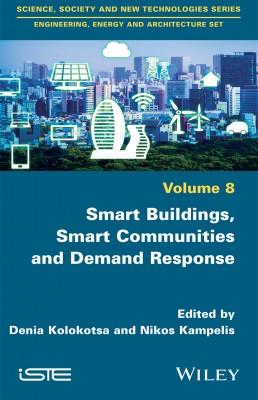
Edited by
Denia Kolokotsa, School of Environmental Engineering of the Technical University of Crete, Greece
Nikos Kampelis, Energy Management in the Built Environment Research (EMBER) laboratory of the Technical University of Crete, Greece
This book focuses on near-zero energy buildings (NZEBs), smart communities and microgrids. In this context, demand response (DR) is associated with significant environmental and economic benefits when looking at how electricity grids, communities and buildings can operate optimally.
In DR, the consumer becomes a prosumer with an important active role in the exchange of energy on an hourly basis. DR is gradually gaining ground with respect to the reduction of peak loads, grid balancing and dealing with the volatility of renewable energy sources (RES). This transition calls for high environmental awareness and new tools or services that will improve the dynamic as well as secure multidirectional exchange of energy and data.
Overall, DR is identified as an important field for technological and market innovations aligned with climate change mitigation policies and the transition to sustainable smart grids in the foreseeable future. Smart Buildings, Smart Communities and Demand Response provides an insight into various intrinsic aspects of DR potential, at the building and the community level.
1. Demand Response in Smart Zero Energy Buildings and Grids, Nikos Kampelis.
2. DR in Smart and Near-zero Energy Buildings: The Leaf Community, Nikos Kampelis, Konstantinos Gobakis, Vagias Vagias, Denia Kolokotsa, Laura Standardi, Daniela Isidori, Cristina Cristalli, Fabio Maria Montagnino, Filippo Paredes, Pietro Muratore, Luca Venezia, Marina Kyprianou Dracou, Alaric Montenon, Andri Pyrgou, Theoni Karlessi and Mattheos Santamouris.
3. Performance of Industrial and Residential Near-zero Energy Buildings, Nikos Kampelis, Konstantinos Gobakis, Vagias Vagias, Denia Kolokotsa, Laura Standardi, Daniela Isidori, Cristina Cristalli, Fabio Maria Montagnino, Filippo Paredes, Pietro Muratore, Luca Venezia, Marina Kyprianou Dracou, Alaric Montenon, Andri Pyrgou, Theoni Karlessi and Mattheos Santamouris.
4. HVAC Optimization Genetic Algorithm for Industrial Near-Zero Energy Building Demand Response, Nikos Kampelis, Nikolaos Sifakis, Denia Kolokotsa, Konstantinos Gobakis, Konstantinos Kalaitzakis, Daniela Isidori and Cristina Cristalli.
5. Smart Grid/Community Load Shifting GA Optimization Based on Day-ahead ANN Power Predictions, Nikos Kampelis, Elisavet Tsekeri, Denia Kolokotsa, Konstantinos Kalaitzakis, Daniela Isidori and Cristina Cristalli.
Denia Kolokotsa is Associate Professor at the School of Environmental Engineering of the Technical University of Crete in Greece, President of the European Cool Roofs Council, Editor of the Elsevier Energy and Buildings Journal and former Editor-in-Chief of the Advances in Building Energy Research Journal.
Nikos Kampelis works as a Research Associate at the Energy Management in the Built Environment Research (EMBER) laboratory of the Technical University of Crete. He completed his PhD on demand response for the optimal integration of loads and renewable energy in microgrids.